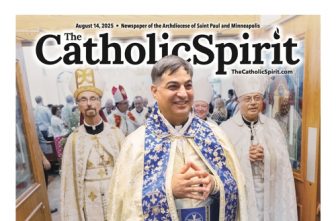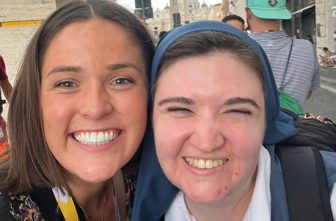
After working more than three decades as a labor-and-delivery nurse, Pam Baker was feeling restless. She was seeking her next adventure, a job that would tap into her vast skill set –– from nursing to nonprofit work to Navy service –– and fuel her faith. Then she found Abria Pregnancy Resources based in St. Paul and Minneapolis, where she was hired last fall as executive director.
“This role is a culmination of everything I’ve done before, where I get to lead with passion and purpose,” said Baker, 54, a member of St. Vincent de Paul in Brooklyn Park. She and her husband, John, are parents of four 20-something children and grandparents of two.
Q) Tell me about your experience helping deliver babies.
A) I made it my practice to walk into the hospital asking for grace. “Heavenly Father, place me where you need me and allow me to be the gift that you need me to be.” I prayed over each mother upon entering. And I was always blessed, at each delivery.
When you’re admitting a patient, you go through a litany of questions, including a question about their spirituality or faith. People would say, “I’m Christian” or “I’m Catholic,” and I was always really intentional about that, and I’d say, “Oh, so am I!”
There was a woman, and we ended up in the operating room. She hadn’t had her epidural, so she was sitting up to get it, and we’re hugging each other –– she’s leaned in, curled over, my mouth is against her ear. They could not get her epidural in. My admission questions allowed me the knowledge that she was Catholic. So, as I leaned into her –– it’s the third or fourth attempt –– I said, “Hail Mary, full of grace,” and we prayed a Hail Mary together. That was the movement that got that epidural placed, and away we went to have a baby!
Q) You encountered messy situations and real-world struggles faced by pregnant women. How has that softened your heart?
A) Ever since my youngest child started kindergarten, I had planned that when I would become an empty nester, I would walk the Camino de Santiago. So, in April of 2023, I went alone to Spain and walked all the way across northern Spain to Santiago. I did not go into my walk with a desire to meet anybody. But I came home with a new family –– a group of 11 of us from nine different countries, speaking seven different languages and coming from very different backgrounds. What I learned is that I was not there for myself. I was there as a child of God. I was there to say: “How can I love you? How can I care for you?”
Every single person I met on that Camino softened my shoulders. I went from this sharp, abrasive approach to, “I am just supposed to love you.”
My favorite prayer is (from) St. Francis of Assisi: “Make me an instrument of peace.” I enter into these friendships not to be understood but to understand, not to be consoled, but to console.
My prayer about this role at Abria began at the Camino. “Heavenly Father, I’m praying for a holy, wise and discerning heart: Please make it clear to me where you want me next.” And it was a culmination of every skill set I’ve ever had. I can finally bring all of my passions together for one singular purpose. I don’t believe in luck. I believe in being prepared for opportunity.
When I think about the women who come through these doors at Abria, it’s the same approach. “Heavenly Father, allow my presence to be a blessing. Help me to understand, to console, knowing the dignity in this human life.”
Q) How did you find this job?
A) I was working as a traveling nurse, and I was getting ready to go back to Iowa City. But I just didn’t want to go. I was so frustrated. I have so much to give. Why can’t I find that space? Why don’t I have an answer yet on where God wants me? That evening, I sent my beautiful auntie a “happy birthday” text. She texted back and said she’d just heard about this position.
When I got the call that I was selected, it was a very easy yes. It felt so, so right.
Q) I love the simple yet profound goal of Abria to cultivate “hope and healing.” What does that look like in action?
A) The eight individuals who work here are the most beautiful, anchored, rooted, devoted people. They have servant hearts. The four young women who meet with our clients radiate peace and compassion. They talk to teenagers facing unplanned pregnancies with such compassion: “How do we step forward when this is so difficult?”
We have an access point in North Minneapolis, in the zip code with the highest percentage per capita of abortions (in Minnesota), and our office is in St. Paul, off University (Avenue), strategically located next near the center that performs the highest number of abortions in the state. Without any question, there is spiritual warfare –– whether it’s trying to take me out by taking out my gall bladder or some other obstacle. But we are so blessed to have an army of prayer warriors who pray over us and alongside of us.
Q) That location must be huge.
A) The impact we have is profound. We can have somebody who just slips in here thinking that they’re coming in for an abortion service, and we tell them we don’t perform those here. We tell them: “You have three options: abortion, adoption or parenting. Where do you want to start?” It’s a beautiful opportunity when we have somebody show up here thinking they’re going to get an abortion today and they leave here thinking, “Perhaps I can do this with the support of someone from Abria.” We offer a plethora of support through our two-year follow-up program. If you’re going to engage with us, we’ll stay with you.
Q) G.K. Chesterton once wrote that hope isn’t the same as optimism. Optimism is rooted in presumption, whereas hope is marked by humility. It begins when someone can “hang on for 10 minutes after all is hopeless.”
A) I love that! That, to me, is dignity. Everybody has crises. If we all just had somebody who would hang on with us for 10 minutes, after all else is hopeless –– and that’s what we’re doing.
Q) I noticed the sign-off you use in email, “Abundantly.” What does that mean to you?
A) Sometimes I write, “Abundantly blessed,” or I modify it to “Abundantly.” Whoever reads it, I want them to know there is abundance for them. You are blessed in abundant ways. It’s as simple as that.
Q) What are the greatest challenges facing Abria right now?
A) No. 1 is the political climate in the state of Minnesota regarding abortion. They want to shut us all down. Prior to 2022, Minnesotans had the right to abortion in the first trimester. Now you can have an abortion up until birth. The law allows that in Minnesota.
No. 2, the majority of abortions right now are done with a pill. It’s happening at home. So, it’s accessibility –– to reach these women earlier so we can provide the care they need before they make a life-altering decision.
Q) How would you reframe the public discourse about pro-life issues? Are we missing something?
A) They don’t speak truths about us. There’s so much slander. That’s what we’re missing: the truth.
Q) What’s your vision for the future of Abria?
A) I am so eager to collaborate! Each pregnancy resource center has its own angle. I want to utilize everybody’s strengths.




